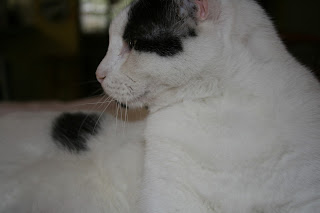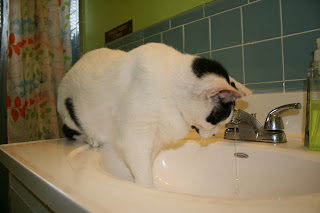Mingus, of the vermilion heart, described it thusly: "It's like she does so much with little - like the individual words are sponges that fill with meaning and grow larger as you read. She doesn't take pages and pages to get to the point - she doesn't need pages and pages - the point is a slow creeping vine that blossoms as you read the collection."
Yes, he really did say that, and I include Mingus' review here because he found his way into the words I was seeking. He is correct - how like to a vine it grows; slowly, stealthy, until the reader is caught in both the moment and its inexorable accumulation.
That is to say, although the topics differ, these essays build upon each other, and ever the careful architect, Loren's creations are poured concrete, yet allow the desultory breeze. They are steady, gently bending pieces which, when placed one after the other, leave you stuck, struck - beyond language.
The prison guard's beautiful grandmother had Parkinson's disease. I say beautiful although I knew her not because the prison guard keeps a painting of her in the living room/front-of-the-house-cell. And she was beautiful - regal and statuesque, but actually statuesque, not Tubby-Kat-Door-Statuesque like I am.
The essay "Margie's Discount" is lovely, elegiac, and although I did not know the prison guard's grandmother, and in general I am ambivalent toward the prison guard at the very best, it brought what could be called tears to my aching eyes.
Might-be-called-tears, because who will believe a cat capable of crying? I am certain there are a number of you laughing right now at the audacity it takes for a cat to believe he weeps, but weep I did, and weep I do when I think of that slow fade.
From vibrant to locked out - MR's grandmother as much a prisoner as I am, more so, trapped in her own body, arms circling endlessly, mouth working like to conversation, but no words, only thin, clear saliva and her blue eyes clouded over. I know because MR told me.
I do not know why she would tell me this.
Perhaps it was a fleeting moment of grief over her deeds, my eternal entrapment in this place, sealed off from the rest of the world. Perhaps she wanted to appear vulnerable, as one who has also been sculpted by grief.
I do not know. I only know what she has said and the sad fact that once a creature knows something, it is not easily unknown, misplaced, unless we suffer the kind of debilitation as the grandmother, as Loren's own mother, as those of us fated to tremble out in the selfsame manner.
Other essays in the collection are equal in brilliance. Loren speaks with compassion on nature, animals, loss, grief, family... On what it means to be.
And I like what she has to say about writing-as-listening. It is what I have been trying and failing and trying and failing and trying and failing to do.
What? Is this as ludicrous to you as a cat-who-weeps? I pity your lack of imagination, dear reader, and your lack of understanding of our inherent sameness.
We who the same air breathe, who for the same water thirst, for the same love burn - we are siblings. If you have ever wanted and not received, if you have ever hungered, if you have ever pressed against your own prison walls, if you have experienced loss - make no mistake.
You are feline, I human: both appendixes to fracturing, fractaling life. Syntactical brethren.
We speak different languages, but the meaning is the same.










